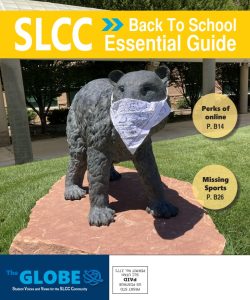Jerri A. Harwell
You have applied, been accepted, and now you are registered for classes at Salt Lake Community College. Congratulations!
Now what?
You are either registered in ENGL 0900 — Integrated Reading and Writing I, ENGL 0990 — Integrated Reading and Writing II, or ENGL 1010 — Intro to Writing; these courses will provide you with a foundation for success not only in future English classes, but other classes across the curriculum. The reading and writing skills you will learn this semester should serve you well in all your General Education (GenEd) courses and program-specific courses.
As you read this chapter, if you are like many students, you might be wondering how to go to college or what do you do now that you are in college. Realize that not only is there a learning curve in each of your classes, there is a learning curve for how to do college.
Some students admit to being anxious the night before their classes begin. Besides not knowing how to do college, they wonder if they will see someone they knew from high school, or if they will they make new friends, or have sit by themselves for the next two years at Salt Lake Community College.
If you do not have family or friends who have gone to college you may not have anyone to “show you the ropes.” You may wander the campus looking not only for your classroom, but the correct building. Being a little lost in this new environment is normal and it won’t last for long.
While this chapter cannot answer all your questions, it can help you acclimate to college and college culture, and outline some basic strategies to be successful in college.
COMMUNITY ENGAGEMENT
There are things to know and things to do as you begin your classes at Salt Lake Community College. Community college students have been known to be C-C-C students; they go from the car to the classroom, and back to the car. Don’t let that be you. The word “community” was used in both sentences intentionally.
Most students want to belong and have social connections. The months of COVID-19 have shown us that.
Any number of current and former students will tell you to find a community while you are here. It may be via the International Center; the Office of Diversity and Multicultural Affairs; the Veteran’s Center; or any number of clubs and associations, such as Black Student Union, Asian Student Association, American Indian Student Leadership, The Creative Writing Group, Global Connections (for refugees), Latinx Student Union, Latter-day Saints Student Association, Pacific Unity Association, Queer Student Association, and many others. [Click here for more about the SLCC Clubs and Organizations.]
Even if you are coming back to school many years after high school or if your college career was interrupted for a few years or many, you belong here and have a role to play in the college community.
These are your “college days.” Enjoy them. Besides getting involved in clubs and organizations to meet other students with interests similar to yours, attend dances, activities, forums, and other activities provided by your Student Life and Leadership.
Involvement increases the stake you have in your college education. In classes, students talk about a certain amount of fun that involvement brings to the college experience.
COURSE LOAD
However, don’t set yourself up for failure. Glory Johnson-Stanton, Manager of Multicultural Student Success and a former academic advisor for eight years, advises students to not “take on additional responsibilities (club officer, etc.) until you have at least completed your first two semesters with a GPA of 2.5 or above.” Prior to that, spend your first year checking out one club a month or by attending Club Rush held in the fall semester.
Additionally, if your high school GPA was below 3.0, Johnson-Stanton advises you to start by going to school part-time; maybe take two classes or six credits. “During your second semester,” she encourages you to “add another class but only if you did well your first semester.”
“School can be a lot of fun, but you need to know when to have fun and when to focus on classes,” she adds. Socializing is part of college. You may or may not have friends “to hang” with outside of school. Regardless, be open to meeting and talking with a variety of people in your classes.
TIME MANAGEMENT
You will need to manage your time. The college offers free online workshops on time management and how to study. Speaking of studying, set aside time to study for each class, at least 30 minutes to 1 hour every day. Take an online free workshop on time management and how to study.
There’s another formula for how much time to spend studying for each class you take. For every 1 hour in class, set aside 2 hours of study time. So, for a 3–credit hour class, you will spend 3 hours in class and then 6 hours a week studying. When you add the 3 hours of class plus the 6 hours of studying, together it equals 9 hours of time each and every week for that one class.
Now assume you are taking 12 credit hours. You will spend 12 hours in class and then 24 hours a week studying. When you add the 12 hours of class plus the 24 hours of studying, together it equals 36 hours of time each and every week for that one semester.
That amounts to almost a full-time job! Not every class will require this much study time. Talk with your instructor the first day and ask.
BODY CLOCK

Know the rhythms of your body clock; don’t try to change your body clock as you begin college. If you have never been one to wake up by 7:00 a.m., don’t take early morning classes. Be sure to schedule classes at least an hour after your normal wake up time and allow for travel time to campus. Likewise, if you are not an evening person, avoid evening classes. You will be tired and unable to focus. If you “come alive” late at night, take online classes that allow you to work when you work best. Know and listen to your body clock as you schedule your classes.
Instructors can see when you submit assignments, but submit them at a reasonable hour ― for you.
PROCRASTINATION
If procrastination is a problem, watch the following TED Talk ― “Inside the Mind of a Master Procrastinator” by Tim Urban. In it, Urban describes his own procrastination experiences in college, why we procrastinate, and efforts to avoid it.
Even “A” students struggle because of procrastination. Recognizing that you procrastinate is half the problem. Learning how to deal with it is the other half. Yes, you can overcome it.
“Complete assignments on time. Once you are overwhelmed and time is not on your side … YOU BECOME STRESSED,” Johnson-Stanton insists.
DISTRACTIONS
“DO NOT take classes with your friends if they are a distraction for you,” urges Glory Johnson-Stanton. You will still be able to remain friends, and real friends (as opposed to frenemies) will understand.
Not only are there distractions inside the classroom, there are many distractions outside of class.
Research shows it can take about 23 minutes to get back the same level of concentration after an interruption (Griffey). While you may think those three hours of studying were productive, they were not if you were interrupted two or three times.
Sometimes your cell phone is how you access Canvas or an online dictionary, use a calculator, etc. Those are beneficial uses and are not considered distractions. Emailing, texting, tweeting, surfing the web, or watching a Netflix series while trying to study is a distraction.
Because those last few activities are easy to do at home, home may not be the best place to study. Take time to learn what works best for you ― studying on campus, at home, with a study group, or other.
THE ALPHABET SOUP*
This class is OER. Head over to AAB and drop into the SWRC. Hang out in the ODMA. Get help with your math homework in the STEM Center. SAT classes begin weekly. What does it all mean?
Students Joseph D. N. and Joey D. N. tell students it is important to learn the “alphabet soup” as they call it. “College has its own language,” according to Joseph D. N. You have to learn the language while you’re learning the course content.
ENGL ― English
OER ― Open Education Resource
AAB ― Academic and Administration Building
SWRC ― Student Writing and Reading Center
ODMA ― Office of Diversity and Multicultural Affairs
STEM ― Science, Technology, Engineering and Math (or sometimes Medical)
SAT ― School of Applied Technology
LGBTQ ― Lesbian, Gay, Bisexual, Transgender, and Queer
ATMs ― Automatic Teller Machines
PROFESSIONAL COLLEGE RELATIONSHIPS
Get to know your professors. Although they may seem intimidating, remember that every professor or instructor had a day when it was their first day in a college class. Yes, they once sat in a college class, just as you are doing.
Joey talks of his relationship with his business class professor. It made all the difference with him being comfortable in college and with college classes. “I finally met someone who cared,” he says.
Get to know your instructors and allow them to get to know you. They may become a mentor who will help guide you through the maze of attending college. Perhaps they can relate to you being here from another country, being an English Language Learner, or being away from home for the first time. In the future, you might even be able to use them as a reference for scholarships or college applications.
THINGS TO KNOW

Read the campus newspaper ― The Globe. Seriously. Especially read the fall semester’s back-to-school edition. It may sound old school to read a print newspaper, but this edition is packed full of information to help new students and returning students navigate college.
These are just some of the campus resources you should be aware of: SWRC, Demke STEM Learning Center, Food Pantry (you can’t focus and concentrate when you’re hungry or worse, your children are hungry), Employment Office, Academic and Career Advisors, Veteran’s Center, Dreamers Center, ODMA, LGBTQ Center.
Learn where the library is, the food court, the ATMs on campuses.
Know where the satellite campuses are so you don’t have to travel so far from your community.
Sources
Griffey, Harriet. “The Lost Art of Concentration: Being Distracted in a Digital World.” The Guardian. 14 Oct 2018. www.theguardian.com/lifeandstyle/2018/oct/14/the-lost-art-of-concentration-being-distracted-in-a-digital-world
Johnson-Stanton, Glory. Email interview. Conducted by Jerri A. Harwell, 6–7 Oct 2020.
Schaeffer, Amie. Photograph. The Globe. Fall ’20 Issue. 10 Aug 2020. www.globeslcc.com
